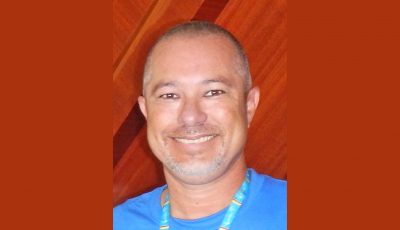The impact of sexual assault and persons with disabilities
April has been proclaimed as Sexual Assault Awareness Month.
I’d like to start off with a statement from our Sexual Assault Proclamation, which reads:
WHEREAS, Sexual assault does not discriminate. While some populations, like children, are more vulnerable, anyone can be a victim of sexual assault, regardless of age, gender, sexual orientation, faith, socioeconomic status, or ability.
A person who experiences limitations to their functional abilities as a result of a mental and/or physical impairment may be considered an individual with a disability. According to the Rape, Abuse, & Incest National Network, sexual assault and abuse of people with disabilities often goes unreported.
When we try to understand the crime of sexual assault against people with disabilities, we need to remember that people with different disabilities may face different challenges and have very different needs. Some disabilities may put people at higher risk for crimes like sexual assault or abuse. For example:
• Someone who needs regular assistance may rely on a person who is abusing them for care, a common factor in elder abuse. The perpetrator may use this power to threaten, coerce, or force someone into non-consensual sex or sexual activities.
• An abuser may take away access to the tools a person with a disability uses to communicate, such as a computer or phone.
• People with disabilities may be less likely to be taken seriously when they make a report of sexual assault or abuse. They may also face challenges in accessing services to make a report in the first place. For example, someone who is deaf or deaf-blind may face challenges accessing communication tools, like a phone, to report the crime or get help.
• Many people with disabilities may not understand or lack information about healthy sexuality and the types of touching that are appropriate or inappropriate. This can be especially challenging if a person’s disability requires other people to touch them to provide care.
• The organization, Disability Justice, found through a 2005 survey that:
• 83% of women with disabilities will be sexually assaulted in their lives.
• 50% of girls who are deaf have been sexually abused compared to 25% of girls who are hearing; 54% of boys who are deaf have been sexually abused in comparison to 10% of boys who are hearing.
• Women with a disability are far more likely to have a history of undesired sex with an intimate partner—19.7% vs. 8.2%.
• Approximately 80% of women and 30% of men with developmental disabilities have been sexually assaulted—half of these women have been assaulted more than 10 times
We also need to consider the role of consent when speaking on sexual assault. Consent is crucial when any person engages in sexual activity, but it plays an even bigger and potentially more complicated role when someone has a disability. Again, some disabilities may make it difficult to communicate consent to participate in sexual activity, and perpetrators may take advantage of this. People with disabilities may also not be given the same education about sexuality and consent that people without disabilities receive. In addition, someone who has a developmental or intellectual disability may not have the ability to consent to sexual activity, as defined by the state laws.
Let’s talk about the impact of sexual assault on survivors of sexual assault, including survivors with disabilities. Post-traumatic stress disorder is fairly common among people who have experienced sexual assault, with one study showing that roughly 70% of survivors of sexual assault experience significant levels of trauma, with 45% reporting symptoms of PTSD. Sexual assault can take a toll on an individual’s physical, sexual, and behavioral health for months or even years after the event took place. The website, VeryWellMind, states that sexual assault can bring on a number of chronic physical conditions. For example, women who have been raped have been found to be more likely to experience:
• Chronic pelvis pain;
• Digestive problems; and
• Intense premenstrual symptoms
Additionally, survivors are at an increased risk of contracting a sexually transmitted infection that can lead to additional physical and emotional problems.
When we think about sexual health after surviving a sexual assault, enjoying sexual contact can be difficult. A survivor may experience low sexual desire and reduced sexual behavior. Shame and guilt stemming from the trauma can also interfere with their desire for and satisfaction from sex.
Other than PTSD, other behavioral health may arise. Some individuals may develop conditions including:
• Eating disorders;
• Generalized Anxiety disorder, like avoiding television shows or news articles that discuss sexual assault;
• Major depression;
• Obsessive-compulsive disorder; and
• Substance use disorders.
Others, however, will continue to experience some form of psychological distress for months or years.
It is important to remember that every person is different and each copes with their experience differently as well. As a community, we should support our survivors of sexual assault as they move into recovery of this life changing event.
Everyone has the right to safety. If you or someone you know has a disability and has experienced sexual assault or abuse, there is support available. If you know of or suspect sexual assault or abuse, you can report it. Contact local law enforcement, our Department of Public Safety.
To speak with someone who is trained to help, you can contact the Wellness Clinic at the Commonwealth Healthcare Corp. They offer services that focus on the emotional and physical needs of crime victims, including helping people to stabilize their lives after a traumatic event. They may be reached at (670) 323-6560 or 6561.
Of course, our friends at the Northern Marianas Coalition Against Domestic and Sexual Violence address the issues of domestic violence and sexual assault through community outreach efforts, providing training to service providers and responders, nurturing meaningful partnerships with groups or individuals, as well as working to create social change.
Individuals with disabilities who experience barriers in reporting sexual assault may contact the Northern Marianas Protection and Advocacy Systems Inc. at (670) 235-7273 or 235-7274 for assistance in removing such barriers as communication or being a voice for those who can’t speak for themselves.
Greg Borja (Special to the Saipan Tribune)
Greg Borja is the executive director of the Northern Marianas Protection and Advocacy Systems Inc.

























